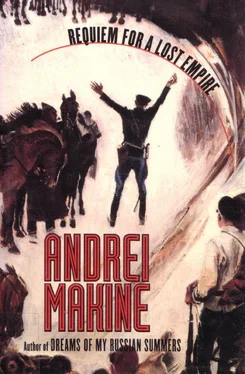I had risen well before dawn, without having really slept, and, as I approached the sea, I had caught it still in its vigilant, nocturnal sluggishness. I had swum in the midst of a darkness rhythmed by long silent waves, gradually losing all awareness of what awaited me, all memory of the country massed behind the coastline ("America," "Florida," a perplexed voice within me proclaimed), all connection with a date, a place. Occasionally a livelier wave rose up out of the blackness, covered me with its foam, disappeared into the night. I recalled the man I was going to see again (an involuntary memory: Vinner's cheek with a fine scratch left by the razor). I was surprised to realize that my hatred of this man was the very last link that still connected me to the lives of those who lived on this sleeping coastline, to their time, to the multiplicity of their desires, their actions, their words, that would start up again once it was morning. Vinner's face faded and I returned to that state of silence and forgetfulness that one day, without finding the right word for it, I had called an "afterlife," it being, in fact, all the life that was left to me to live out, in what was now a bygone age, that past I had never succeeded in leaving behind. I had remained sitting on the sand for a long time, leaning against the hull of an upturned boat. The night above the sea formed a deep, black, vibrant screen, like the restless darkness behind closed eyelids. Against this nocturnal background the memory drew faces from long ago, a figure lost among those ruined days, a look that seemed to be searching for me across the years. You. Shakh. You… The ghosts of this afterlife did not obey time. I saw people I had hardly known, people who had died well before I was born: that soldier, his glasses spattered with mud, carrying a wounded man on his back; that other one, lying in a field plowed up by shellfire, his lips half open, and a nurse holding out a tiny mirror toward them, hoping, or not hoping, to capture a slight trace of breath. I also saw the one who had told me of these soldiers, a woman with silvery hair, at rest in the endlessness of the steppe, gazing at me across that plain, across time, as it seemed to me. A man, too, with a face of quartz, a strip of bandages around his forehead, who smiled as he spoke, defying the pain. Shakh walking along in a crowd in an avenue in London; he was keeping our rendezvous, but had not yet seen me and I surprised him in his solitude. You, at a dark window lit by the ruddy glow of fires in neighboring streets. You, your eyes closed, lying beside me one night after the fighting was over, telling me about a winter's day, the forest silent under the snows, a house one could discover by crossing a frozen lake. You…
I had stood up when I noticed that the sand was beginning to be colored by the first glow of the morning. The night, still this negative that sheltered me, was going to evolve into the sunlit shades of blue of a day by the sea. It would fill with tanned bodies and shouts, imprint itself as a happy holiday snapshot. I had hurried to extricate myself from this snapshot in the making, gone up onto the dune (from the top of it, in the distance, one could see the first houses and the terrace of the café where Vinner was due to join me in two and a half hours' time), and taken my place on this bench, sheltered from the wind that was already blowing the tops off the waves.
The sun-drenched silence of the place, sheltered by the dune and, behind it, the scrub, filtered out the sounds one by one: now a shout coming from the beach, now a car passing beyond the trees. These sounds seemed to come from very far away, isolated by distance, like signals from an alien world. This world, another holiday morning, was waking up all around me, routinely genial in its ways, making my presence here more and more incongruous. I was a man who had come from a forgotten age to demand satisfaction from a vacationer who, but for my arrival, would have been playing with his two children, making sandcastles or catching shellfish. One could hear voices more frequently and more distinctly, carried up from the beach by the wind. The hum of vehicles was becoming more continuous. There was a tone of triumphal tranquillity in the rhythm with which the sounds of the day were gradually coming together. I was a ghost whose presence could make absolutely no difference to it.
But a brief jolt in these cadences drew me out of my drowsiness. The sound of a car stopping and driving off again at full tilt. It all happens so quickly that I am not aware in what order the noises come. "Someone's opened a bottle of champagne," suggests one thought numbed by the sun. But before this dull pop, suddenly matched by a burning pain in my shoulder, before this pain there is a leap: two adolescent boys come running down the dune, preceded by their kite which, buffeted by the wind, struggles on the slope, climbs again, then hurtles straight at me. I lean to avoid it. It tangles me up in its nylon threads. It is at this moment that someone opens a bottle of champagne behind the trees. The boys rush toward me, yelling apologies, and disentangle me. Their "sorry" is said in tones of: "Gee, we're sorry, but you'd have to be a total idiot to be sitting on that bench. It's bad enough with all those people getting in our way on the beach." During their maneuvering I have time to reconstruct the sequence of noises. First the appearance of the kite, grazing my head. The man who just fired at me (with a silencer: the "champagne"), aiming from his car that had stopped behind the trees, was put off his aim by the appearance of the boys. He did not fire a second shot. A professional would have had to do it, even if it meant bringing down a couple of kite flyers. I slip my hand under the beach towel around my neck. Fingers have a memory of old gestures on the bodies of the wounded: a flesh wound, nothing more, already a lot of blood. Mustn't frighten the children. They scramble off up the dune. The wings of their kite flap in the wind. They have noticed nothing.
At the hospital reception desk it took me quite a long time to prove I was creditworthy. The receptionist explained to me in detail what type of medical insurance I needed in order to be admitted. The towel on my shoulder was no longer holding the blood and this was trickling down my arm. I managed to get her to accept my credit card. She telephoned a superior for reassurance. On the walls I looked at the photos showing off the most high-performance equipment the hospital had at its disposal. While she was talking the receptionist was wiping my card with a Kleenex tissue to remove the bloodstains, then she wiped her fingers with a swab soaked in alcohol.
In the corridor where they made me wait I came upon a whole row of young cooks in their white uniforms, some of them with their hats on their heads. Each of them, all in identical postures, was holding an injured hand wrapped in an emergency bandage. They looked as if they were the victims of a mad killer bent on exterminating all kitchen staff. Tiredness at first stopped me realizing that these were simply accidents at work. Hundreds of restaurants along the coast, knives that cut a finger at the same time as a slice of steak. As I awaited my turn I thought again about Vinner's stinginess in hiring a killer who was not really professional, a cheap contract for the easy prey that I was. I recalled the receptionist explaining to me with faultless logic why I had no right to medical attention. This whole world, with its triumphal air, seemed to me quite simply pathetic, like an account book someone had tried to brighten up with a few picturesque seaside views.
The nurse who came to fetch me thought I had lost consciousness. I was sitting motionless, my eyes closed, the back of my neck against the wall. In the questionnaire the receptionist had told me to fill in I had just discovered, at the very bottom, this form of words: "Person to contact in case of emergency" I had replied to all the other questions and I was getting ready to put a name beside this one… The name of a relative, of a friend. I thought of you. Of Shakh. In a flash of memory I pictured a white-haired woman at the heart of the steppe… I realized that you were the only people whose names I could have written on this line in the questionnaire. The only ones among whom I still felt alive.
Читать дальше










